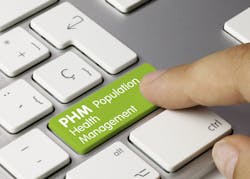America’s Essential Hospitals, an organization whose more than 300 members care for low-income and other marginalized people, recently recognized four member hospitals for outstanding work to improve healthcare quality and population health.
The organizations’ Gage Awards are named for association founder Larry Gage and recognize creative and successful programs that improve patient care and serve community needs.
2023 Award for Quality
UK HealthCare, the academic health system of the University of Kentucky, and the University of Louisville, as the two state teaching hospitals, designed a value-based Medicaid directed payment program focused on improving care for Kentucky’s toughest health challenges.
From July 2019 to June 2022, UK HealthCare made great strides in improving care for target health conditions, including increasing:
- Depression screening by 64 percentage points.
- Well child visits for children ages 3 to 6 by 45 percentage points.
- Blood pressure control by 27 percentage points.
“Kentuckians face some of the highest rates of disease in the country, particularly for cancer, heart disease, obesity, behavioral health, and substance use disorders. As part of our academic health system’s promise to advance Kentucky, we have partnered with Kentucky Medicaid to transform the quality of patient care to improve the health of the commonwealth,” said Robert DiPaola, M.D., UK’s provost and acting co-executive vice president for health affairs, in a statement. “I’m honored that this work is being recognized on a national level.”
Honorable Mention: To improve health equity, NYC Health + Hospitals launched the Care Improvement Contest initiative to educate healthcare workers on patient experience and build their capacity to lead successful quality improvement projects.
Eleven teams documented the current state of the inpatient experience; discussed gaps, challenges, and barriers to success; and devised and tested solutions. Projects focused on nurse leader rounding, interdisciplinary provider rounding, empathy skill building and teach-back training, complex discharge planning and post-discharge follow-up, and daily management system boards and whiteboards. In addition to improving patient experience scores in winning units, the contest facilitated a systemwide increase in patient experience scores, including communication with physicians and nurses and overall hospital ratings.
2023 Award for Population Health
To mitigate health disparities illuminated through a Community Health Needs Assessment, Dallas-based Parkland Health established nine population health initiatives focused on access to care, behavioral health, breast health, diabetes, hypertension, maternal and child health, pediatric asthma, sexually transmitted infections, and cultural competency.
Parkland hired community health workers from target ZIP codes to perform health screenings, connect individuals with social resources, and provide cultural competency materials approved by Parkland Health’s Patient Advisory Council. The health system implemented a community health record to document screenings and associated care navigation.
Between 2019 and 2022, Parkland reported:
- A 264 percent increase in primary care encounters.
- A 123 percent increase in annual hypertension screenings.
- A 40 percent increase in the percentage of newly diagnosed HIV patients treated within 30 days.
- A 16 percent increase in blood pressure control.
- A 12 percent increase in chlamydia testing within at-risk ZIP codes.
- A 7 percent increase in annual mammograms.
“We are honored to be recognized by America’s Essential Hospitals for our work to advance health equity in Dallas County. At Parkland Health, we strive to ensure equitable care for our patients and to address inequities in health care at the community level,” says Fred Cerise, M.D., Parkland’s president and CEO, in a statement. “To be recognized for our work on the CHNA initiatives is a tribute to our many dedicated team members and community partners who are working together to address health disparities among the people we serve.”
Honorable mention went to Sinai Chicago. In 2018, Sinai Urban Health Institute (SUHI), the health system’s community-driven research center, piloted a program to identify social determinant of health (SDOH) needs among patients presenting to the emergency department with nonfatal gun violence injuries, which later expanded to include patients with complex needs. Community health workers (CHWs) contact patients post-discharge, screen patients for SDOH needs, reinforce discharge instructions, and help patients navigate follow-up care and community resources.
Since July 2020, Sinai Chicago has referred more than 2,131 high-risk patients to the program. Fifty-two percent of patients referred were successfully screened for SDOH, 83 percent of whom were connected to services to target food insecurity, transportation, housing insecurity, behavioral health, asthma, and domestic violence. Patients screened by CHWs had a 30-day readmissions rate of 22 percent, compared with a 31 percent readmissions rate for patients who were referred to the program and not screened.
“Essential hospitals believe all people deserve exceptional and equitable care, so programs to improve quality and reduce socioeconomic barriers to care are deeply engrained in the fabric of our members,” says Kalpana Ramiah, Dr.P.H., MSc, America’s Essential Hospitals’ vice president of innovation and director of Essential Hospitals Institute, in a statement. “We commend our members for their commitment to a role no one else fills: providing high-quality care for all.”


